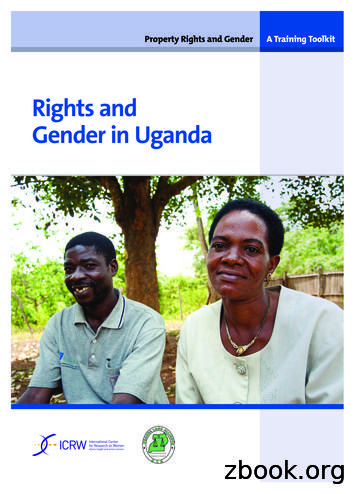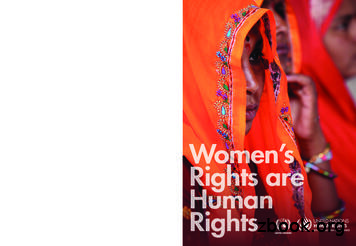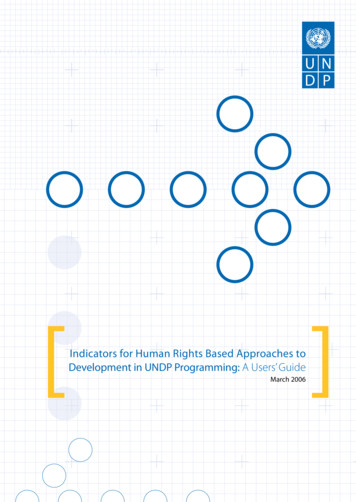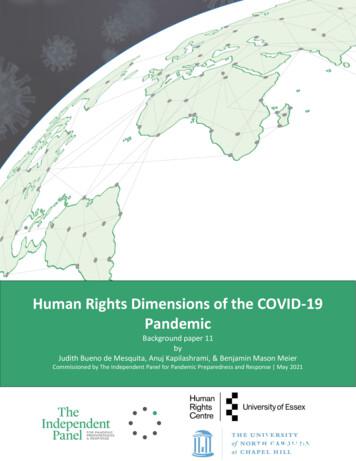Human Rights Awareness Education
UNCLASSIFIEDHUMAN RIGHTSAWARENESSEDUCATIONFOR GENERAL OFFICERS AND FLAG OFFICERS
UNCLASSIFIEDLesson 1Human Rights Law, Policy,Doctrine, and Procedures1
UNCLASSIFIEDA central goal of U.S. foreign policyis promotion of respect for humanrights, as embodied in theUniversal Declaration of HumanRights.Human rights are freedoms,immunities, and benefits that aredeemed universal, inherent, andinalienable possessions of allhumankind.This means that human rights arenot a concession granted bysociety or any particulargovernment.* Military units are responsible for providing Law of War (LOW) training. Consultyour chain of command or SJA if you are in doubt about Law of War requirements.Human Rights Law requires anation to guarantee thefundamental human rights of itscitizens throughout the peace-warpeace spectrum. The Law of War*is that part of international law thatregulates the conduct of armedhostilities.
UNCLASSIFIEDFor U.S. personnel, standards ofrespect for Human Rights and Lawof War (also known as Law ofArmed Conflict, or LOAC, andInternational Humanitarian Law, orIHL) are codified in internationaltreaties, customary internationallaw, national laws, the UniformCode of Military Justice (UCMJ),Department of Defense Directives,and USSOUTHCOM Regulations.The U.S. accepts the position thatcertain fundamental human rightsfall within the category ofCustomary International Law andthat Customary International Lawis legally binding under allcircumstances.U.S. law and defense policy alsorequire U.S. personnel to positivelyinfluence host nation counterparts‟knowledge of and respect forhuman rights.
UNCLASSIFIEDU.S. law prohibits security andmilitary assistance to any countrywhose government engages in aconsistent pattern of grossviolations of internationallyrecognized human rights.U.S. law also prohibits using fundsto support any training of foreignmilitary personnel or units if theSecretary of Defense has receivedcredible information from theDepartment of State that thepersonnel or members of a unit tobe trained have committed a grossviolation of human rights, unlesscorrective steps have been takenby the government of that country.
UNCLASSIFIEDJoint Doctrine on Foreign InternalDefense (JP 3-07.1) states:“The U.S. military has considerableability to influence theprofessionalism of the host nationmilitary, and thus its democraticprocess. In such cases, successmay depend on U.S.representatives being able topersuade host military authoritiesto lead or support reform effortsaimed at eliminating or reducingcorruption and human rightsabuse.”Several Department of DefenseDirectives outline authorities andresponsibilities for theimplementation of human rightspolicy, plans, and activities bysenior defense leaders.
UNCLASSIFIEDAnother area in which U.S.personnel must be vigilant isTrafficking in Persons (TIP).Every year 600-800,000 men,women, and children worldwideare trafficked across internationalborders and within national bordersand many are forced intoprostitution, work in sweatshops,on farms, as child soldiers or otherforms of indentured servitude; inother words, they are slaves.The U.S. Government considersTIP to include all acts involved inrecruitment, abduction, transport,harboring, transfer, sale or receiptof persons through force, coercion,fraud or deception.DOD has a ZERO TOLERANCEpolicy toward TIP.
UNCLASSIFIEDDOD INSTRUCTION NUMBER2200.01, February 16, 2007“It is DOD policy to opposeprostitution, forced labor, and anyrelated activities that maycontribute to the phenomenon ofTrafficking in Persons (TIP) asinherently harmful anddehumanizing. TIP is a violation ofUnited States law andinternationally recognized humanrights and is incompatible withDOD core values.”The Department of Defenseopposes prostitution and relatedactivities that contribute to TIP.TIP is a violation of human rights.TIP is cruel and demeaning.TIP undermines PeacekeepingOperations (PKO).TIP is incompatible with militarycore values.
UNCLASSIFIEDThe USSOUTHCOM HumanRights Standing Orders Card (SCForm 165) contains Human RightsReporting Procedures for allsuspected human rights violations.USSOUTHCOM Regulation 1-20states that all personnelpermanently or temporarilyassigned to USSOUTHCOM mustbe issued the Human RightsStanding Orders Card within60 days of arrival on station.You can obtain this card on theUSSOUTHCOM web portal orthrough the USSOUTHCOMHuman Rights Branch. The contentof this card is displayed here andshould be used for reference untilyou can physically obtain thepocket card.
UNCLASSIFIEDRECOGNIZEwhat constitutes a human rights violation.Following are more detailedexplanations of the Human RightsReporting Procedures (the “Five„R‟s of Human Rights”).RECORDviolations in detail (time, day, location,personnel).Commit these to memory, as theywill help you to know what to do inany given human rights situation,especially in situations that involvehuman rights complications forwhich your Rules of Engagementand Law of War training may notimmediately present an obviouscourse of action. Above all, youhave a responsibility to REPORTany human rights violation orsuspected human rights violationthat you may witness.REPORTviolations to your chain of command.These will apply to the scenariospresented at the end of the course,and may appear on the test.REFRAINfrom committing or supporting thecommission of human rights violations.REACTto human rights violations—intervene if itwill not endanger you or your unit.
UNCLASSIFIEDRECOGNIZEA nation, representative of anation, and non-state actorsinvolved in armed conflict violateCustomary International Law whenthey commit: genocide; slavery, or the trafficking ofslaves; murder or forced disappearance; torture or other cruel, inhumane,or degrading treatment orpunishment; prolonged arbitrary detention; systematic racial discrimination; or a consistent pattern ofcommitting gross violations ofinternationally recognized humanrights.
UNCLASSIFIEDREFRAINAll DOD personnel are governmentofficials, and government officialsmust not commit or aid in thecommission of human rightsviolations. DOD personnel maybe held responsible for the actsof subordinates and possiblythe acts of peers.Upon encountering apparentviolations in host nations, DODpersonnel should generallydisengage from the activity andleave the area, provided they candisengage without endangeringtheir mission.
UNCLASSIFIEDREACTIf the conduct of a U.S.government official involves aviolation of human rights, such asrape or torture, you must attemptto prevent the violation. If theviolation involves detainee abuse,do not raise legal questions in frontof detainees. Take the official asideand use moral dissuasion to detercontinued abuse.Commanders are responsiblefor the actions of theirsubordinates. Subordinates areaccountable for their own actions.If you receive a clearly illegal orderto commit a human rights violation,your duty is to ask for clarification,ask the superior to rescind orchange the order, refuse to obeysuch an order, and report theillegal order to your chain ofcommand.
UNCLASSIFIEDREACT (continued)If the conduct of a foreigngovernment official involves aviolation of human rights,intervention to protect a victim maybe appropriate in certain limitedcases.If a death, dismemberment or rapewill almost certainly occur, it isappropriate to intervene as long asyou incur no serious threat to yoursafety or the security of your unit,and intervention will not adverselyaffect your mission. Attempt toprevent the violation with moraldissuasion.PERSONNEL ARE NOTAUTHORIZED TO USE VIOLENTFORCE when intervening toprevent a human rights violation,except when authorized by specificRules of Engagement or whenacting in self defense.
UNCLASSIFIEDRECORDIf a violation does occur, you mustemploy all available means torecord the event: Write it down. Use recording media(audio/video), photography,diagrams and grid coordinates. Preserve the evidence.Remember the site will likely beexamined later by professionalcrime investigators.Be cautious about entering thescene without clearance from ahigher authority.
UNCLASSIFIEDREPORTAll DOD personnel will immediatelyreport all instances of suspectedviolations of human rights to theirchain of command. If the chain ofcommand itself is implicated,report the incident or illegal orderto the Staff Judge Advocate (SJA),Inspector General (IG), chaplain,or provost marshal.Identify the official who appears tohave committed the violation,describe the victim(s), specify theviolating conduct, and statewhether any DOD personnel wereinvolved.As appropriate, providerecommendations as to what thecommander should do to protectthe victim(s), restore the statusquo, and preserve the evidence ofthese events.
UNCLASSIFIEDLesson 1 Learning CheckWhich of the following bestdescribes human rights in relationto the law of war?(a)Human rights are separate fromthe law of war and guaranteeuniversal civil, political, andsocial rights only in times ofpeace.(b)Human rights law is that part ofinternational law that regulatesthe conduct of armed hostilitiesand is also known as Law ofArmed Conflict (LOAC).(c)Human rights are inalienablerights that apply throughout thepeace-war-peace spectrum,whereas the law of war is thatpart of international law thatregulates the conduct of armedhostilities.(d)Human rights exist only as aresult of the proper discipline ofmilitary forces.
UNCLASSIFIEDLesson 1 Learning CheckWhich of the following bestdescribes human rights in relationto the law of war?Correct answer:(c)Human rights are inalienablerights that apply throughout thepeace-war-peace spectrum,whereas the law of war is thatpart of international law thatregulates the conduct of armedhostilities.
UNCLASSIFIEDLesson 1 Learning CheckShould you encounter a suspectedhuman rights violation by amember of the host nation securityforces, what should you do next,assuming there is no further threatof loss of life or grievous injury?(a)Make a record of the events thatyou witnessed, using recordingmedia if possible, and report theevents to your chain ofcommand.(b)Disengage and return to yourunit headquarters as quickly aspossible so you can write yourAfter Action Report moreaccurately from memory.(c)Immediately call in host nationlaw enforcement authorities toinvestigate.(d)All of the above.
UNCLASSIFIEDLesson 1 Learning CheckShould you encounter a suspectedhuman rights violation by amember of the host nation securityforces, what should you do next,assuming there is no further threatof loss of life or grievous injury?Correct answer:(a)Make a record of the events thatyou witnessed, using recordingmedia if possible, and report theevents to your chain ofcommand.
UNCLASSIFIEDLesson 2U.S. and Host Nation Counterparts’International Obligations
UNCLASSIFIEDMany societies in history haveclaimed some version of civil rights(state granting of specified rights tothe individual), but staterecognition of inalienable humanrights (neither granted nor takenaway by the state) was firstarticulated in America‟s 1776Declaration of Independence andin France‟s 1789 Declaration of theRights of Man. The concept ofinternational law (enabling staterecognition of the rights of noncitizens), was introduced evenearlier, in the 16th and 17thcenturies, through the treaties andmilitary reforms that createdmodern Europe. Military historianscredit traditional international lawwith having made 18th centurywarfare more humane, involvingsuch conventions (though notalways enforced) as safe conductand protection of non-combatants.UNCLASSIFIED
UNCLASSIFIEDThe 19th and 20th centuries,however, saw the Napoleonicreintroduction of “total war”doctrine and two world wars. Notonly did traditional international lawfail to limit the destructiveness ofmodern warfare, it also saidnothing about what states could doto their own citizens. Because ofthe atrocities of the Second WorldWar, nations have recognized theneed to protect human rightsthrough binding internationalagreements.Although the UN GeneralAssembly‟s 1948 UniversalDeclaration of Human Rights is nota treaty and therefore not legallybinding, many of its provisionshave come to be regarded asCustomary International Law or areincluded in binding human rightstreaties.UNCLASSIFIED
UNCLASSIFIEDThe United States is bound byseveral conventions and humanrights treaties, including thefollowing: The Four Geneva Conventions(1949) Convention on the Preventionand Punishment of the Crime ofGenocide (1951) International Covenant on Civiland Political Rights (1976) Convention Against Torture andOther Cruel, Inhuman orDegrading Treatment orPunishment (1987)Although the U.S. is not a party tothe 1977 Additional GenevaProtocols, all countries within theUSSOUTHCOM AOR are parties.The U.S. recognizes many of theirprovisions as CustomaryInternational Law.UNCLASSIFIED
UNCLASSIFIEDThe specific violations ofCustomary International Law thatDOD personnel must report if theyare observed include: genocide; slavery, or trafficking of slaves; murder or forced disappearance; torture or other cruel, inhumane,or degrading treatment orpunishment; prolonged arbitrary detention; systematic racial discrimination; or a consistent pattern ofcommitting gross violations ofinternationally recognized humanrights.Military planning shouldincorporate means to protectthe human rights of all personslikely to be affected by militaryoperations.UNCLASSIFIED
UNCLASSIFIEDNearly all nations in theUSSOUTHCOM AOR havesubjected their own governmentsto the jurisdiction of the InterAmerican Court of Human Rights,created in 1978 by the AmericanConvention on Human Rights, alsoknown as the Pact of San José.The United States signed theconvention in 1977 but did notratify, in part because ofconstitutional concerns over thejurisdiction of the court.Nevertheless, your host nationcounterparts are subject to itsjurisdiction. They risk subjectingtheir governments to fines and lossof national prestige if they commithuman rights violations. Theirgovernments also may be requiredto pay reparations to victims and tomake legislative, constitutional,and policy changes, and mayreopen any domestic prosecution.UNCLASSIFIED
UNCLASSIFIEDUSSOUTHCOM AOR States Partiesto the Rome StatuteAntigua and lombiaCosta RicaDominicaDominican RepublicEcuadorGuyanaHondurasPanamaParaguayPeruSt. Kitts and NevisSt. Vincent/GrenadinesSurinameTrinidad and TobagoUruguayVenezuelaUNCLASSIFIEDThe International Criminal Court(ICC) was established byinternational treaty at a UnitedNations conference in Rome on 17July 1998 and covers cases ofgenocide, crimes against humanity,and war crimes. The United Statessupports the prosecution of suchcases in the domestic courts or inad hoc international tribunals eventhough it has not ratified the treaty.The ICC has jurisdiction only if theaccused is a national of a StateParty to the treaty, if the allegedcrime took place in the territory of aState Party, or if the case has beenreferred by the UN SecurityCouncil regardless of nationality ofthe accused or site of the allegedcrime. Most nations in theUSSOUTHCOM AOR are StatesParties to the treaty.
UNCLASSIFIEDMinisters of Defense and Chiefs ofDefense from most nations in theUSSOUTHCOM AOR participatedin a 1997 hemispheric humanrights conference sponsored byUSSOUTHCOM and the InterAmerican Institute of HumanRights.The USSOUTHCOM CDR offeredto sponsor a regional process tosupport partner nation militaries inbuilding military human rightsprograms that came to be knownas the Human Rights Initiative(HRI).UNCLASSIFIED
UNCLASSIFIEDAll of the democratic nations in thehemisphere participated inseminars from 1997-2002 todevelop the "ConsensusDocument", agreeing to focus on: Doctrine Education and Training Internal Control Systems Cooperation with CivilianAuthoritiesPartner nations receive directassistance from USSOUTHCOM inthose areas, and often look to U.S.personnel for advice andleadership.UNCLASSIFIED
UNCLASSIFIEDThe nations of the USSOUTHCOMAOR have had a difficult history inwhich some governments in thepast violated or failed to protect thehuman rights of their own citizens.Perhaps as a result of this,however, these same nations alsohave made important contributionsto the development of keyinternational human rights norms.Several of these are leading theway on military human rightsreform in particular. They aremaking important advances, forexample, in implementing newoperational rules and proceduresfor complex security and stabilitymissions in which safeguardingcivilian security is of highestimportance. This enables them toexpand their contributions topeacekeeping and other importantinternational missions.UNCLASSIFIED
UNCLASSIFIEDLesson 2 Learning CheckWhich of the following documentswas the first to formally declare theinalienable rights of all mankind?(a)The English Bill of Rights(b)The U.S. Declaration ofIndependence(c)The French Declaration of theRights of Man(d)The Universal Declaration ofHuman Rights
UNCLASSIFIEDLesson 2 Learning CheckWhich of the following documentswas the first to formally declare theinalienable rights of all mankind?Correct answer:(b)The U.S. Declaration ofIndependence
UNCLASSIFIEDLesson 2 Learning CheckTo which of the followingconventions is the United Statesobligated?(a)The Four Geneva Conventions(1949)(b)International Covenant on Civiland Political Rights (1976)(c)Convention Against Torture andOther Cruel, Inhuman orDegrading Treatment orPunishment (1987)(d)All of the above
UNCLASSIFIEDLesson 2 Learning CheckTo which of the followingconventions is the United Statesobligated?Correct answer:(d)All of the above
UNCLASSIFIEDLesson 2 Learning CheckAlthough U.S. personnel do not fallunder the jurisdiction of the InterAmerican Court, most host nationpersonnel in the USSOUTHCOMAOR do. Which of the following arepossible consequences ofprosecution in the Inter-AmericanCourt?(a)Fines and reparations paid bythe host nation government(b)Mandated changes to policy,laws, or even the host nation‟sconstitution(c)Reopening of domesticprosecution against the accused(d)All of the above
UNCLASSIFIEDLesson 2 Learning CheckAlthough U.S. personnel do not fallunder the jurisdiction of the InterAmerican Court, most host nationpersonnel in the USSOUTHCOMAOR do. Which of the following arepossible consequences ofprosecution in the Inter-AmericanCourt?Correct answer:(d)All of the above
UNCLASSIFIEDScenarios
UNCLASSIFIEDSCENARIO: Questionable TrainingYou are a guest monitoring a hostnation training activity beingconducted by a host nation militaryofficer who is preparing youngerofficers for operations in support oflaw enforcement, such as protectionof a prison perimeter during a policeraid to quell an inmate riot. Theinstructor describes a scenario inwhich soldiers on the perimetercapture a fleeing inmate and areholding him for turnover to policecustody. The instructor suggests thatbecause the police are preoccupied,the soldiers would be permitted toaggressively interrogate the inmateabout other inmates who may haveplanned the riot, using death threatsto intimidate the suspect. Some of thestudents turn and look at youquizzically, as if trying to ascertainyour opinion on the matter.What do you do?
UNCLASSIFIEDSCENARIO: Questionable TrainingWHICH OF THE FOLLOWING ISTHE RIGHT REACTION TO THETRAINING?(a)Remain quiet and neutral, butapproach the instructorimmediately after the class toinform him some studentsseemed concerned about thescenario.(b)Disregard the remarks, as it isnot your place to comment onhost nation laws.(c)When appropriate, respectfullystate that US policy is topromote respect for humanrights in such situations. Do notappear to agree with instructionthat runs counter to US policy.Report the problematic trainingto your chain of command.(d)Get up and leave without sayinga word.
UNCLASSIFIEDSCENARIO: Questionable TrainingANSWER:(c)When appropriate, respectfullystate that US policy is topromote respect for humanrights in such situations. Do notappear to agree with instructionthat runs counter to US policy.Report the problematic trainingto your chain of command.Joint Doctrine on Foreign InternalDefense empowers you as arepresentative of the U.S. defenseestablishment to positively influenceforeign militaries‟ respect for andunderstanding of human rights andinternational law. In situations in whichforeign military personnel appear toadvocate actions that may violatehuman rights, it is your responsibilityto respectfully represent U.S. policyon respect for human rights.
UNCLASSIFIEDSCENARIO: Trainee AbuseYou witness a host-country militaryofficer physically abusing his traineein a clearly life-threatening manner.What should you do?
UNCLASSIFIEDSCENARIO: Trainee AbuseWHICH OF THE FOLLOWING ISTHE RIGHT COURSE OF ACTION?(a)Persuade the officer to desist,warning that failure to complywill result in a direct report to hissuperiors.(b)Persuade the officer to desist,intervening as long as it posesno serious threat to your safetyor your mission. Record andreport this incident.(c)Recognizing that a life is atstake, immediately intervenewith violent force. Record theincident and report it to yourchain of command.(d)Immediately disengage withoutsaying a word, and report theincident to your chain ofcommand.
UNCLASSIFIEDSCENARIO: Trainee AbuseANSWER:(b)Persuade the officer to desist,intervening as long as it posesno serious threat to your safetyor your mission. Record andreport this incident.If the conduct of a foreign governmentofficial involves a violation of humanrights that will almost certainly resultin death, dismemberment, or rape, it isappropriate to intervene to protect thevictim provided that: this can be done without use ofviolent force (unless you have specificRules of Engagement authorizing thisor are acting in self defense); incurs no serious threat to yoursafety and the security of your unit; and will not adversely affect yourmission.
UNCLASSIFIEDSCENARIO:Questioned on U.S. Human Rights PracticesYou have just concluded aninformation briefing of host nationpersonnel at a Subject Matter ExpertExchange on incorporating humanrights considerations into the militaryplanning process, and have openedthe floor to questions and answers. Ajunior officer eagerly stands up andasks, “how can you come here andtalk to us about human rights wheneveryone knows the United Stateshas violated human rights atAbu Ghraib and Guantanamo?”How do you respond?
UNCLASSIFIEDSCENARIO:Questioned on U.S. Human Rights PracticesWHICH OF THE FOLLOWING ISTHE RIGHT RESPONSE TO THEQUESTION?(a)“I‟ll have to defer that question tothe U.S. embassy. Pleasecontact a State Departmentrepresentative.”(b)“Compared to other nations, theUnited States‟ human rightsrecord is excellent. The mediaexaggerates the concerns.”(c)“The difficulties we‟ve facedshow we are under the samepressures you are under infighting terrorists.”(d)“It is U.S. policy to treatdetainees in a mannerconsistent with U.S. law andinternational conventions, and torespect the rights of protectedpersons. Human rights abuse isagainst our values, and wemaintain systems for punishingviolators.”
UNCLASSIFIEDSCENARIO:Questioned on U.S. Human Rights PracticesANSWER:(d)“It is U.S. policy to treatdetainees in a mannerconsistent with U.S. law andinternational conventions, and torespect the rights of protectedpersons. Human rights abuse isagainst our values, and wemaintain systems for punishingviolators.”Address such questions forthrightlyand be clear and confident on U.S.policy regarding human rights.Respect for human rights is the lawand is central to U.S. foreign policy.Joint Doctrine empowers you topositively influence host nationmilitaries in this regard. While notconveying a sentiment of moralsuperiority, you should uphold theU.S. position of leadership andexample-setting on respect for humanrights and other democratic values.
UNCLASSIFIEDBOTTOM LINE:RESPECT FOR HUMAN RIGHTS IS CENTRAL TO U.S. LAW, POLICY, DOCTRINE, AND TRADITION.IT SECURES TRUST, DETERS AGGRESSION, PROMOTES THE RULE OF LAW,AND STRENGHTENS DEMOCRACIES.You have now completed your Human Rights Awareness Education for General Officers and Flag Officers.Please sign and retain the certificate on the following page for your records.Contact the USSOUTHCOM Human Rights Branch at (305) 437-1560 if you have any questions.
UNCLASSIFIEDHuman Rights Awareness EducationCertificate of CompletionI, affirm that I have read and understoodthe Human Rights Awareness Education for General Officers and Flag Officers.SignatureDate
Human rights are freedoms, immunities, and benefits that are deemed universal, inherent, and inalienable possessions of all humankind. This means that human rights are not a concession granted by society or any particular government. Human Rights Law requires a nation to guarantee the fundamental human rights of its citizens throughout the .
A Human Rights Perspective by David Shiman Raising Children with Roots, Rights and Responsibilities: Celebrating the UN Convention on the Rights of the Child by Lori DuPont, Joanne Foley, and Annette Gagliardi Lesbian, Gay, Bisexual, and Transgender Rights: A Human Rights Perspective by David M. Donahue The Human Rights Education Handbook:
Rights and gendeR in Uganda · 3 Rights & Human Rights Background Rights The law is based on the notion of rights. Community rights workers need to understand what rights are, where rights come from, and their own role in protecting and promoting rights. Community rights worker
2018 Cause Awareness Day Calendar January Alzheimer’s Disease Awareness Month Cervical Health Awareness Month Dry January National Blood Donor Month National Glaucoma Awareness Month Thyroid Awareness Month 8-14 – Obesity Awareness Week 11 – National Human Trafficking Awareness
make up the International Bill of Human Rights. The provisions of the two Covenants, as well as other human rights treaties, are legally binding on . of their human rights, for example marriage and the family. 6 WOMEN’S RiGHTS ARE HUMAN RiGHTS The Convention defines d
stream human rights into development projects and to monitor and implement a human rights-based approach (HRBA) to development more generally. From the side of human rights, the demand has come from recognition among the human rights treaty monitoring bodies, the Office of the High Commissioner for Human Rights, and a variety of Special .
human rights impact of COVID-19 and COVID-19 responses on human rights; the role of global health and human rights governance actors, including the WHO, World Health Assembly, Office of the High Commissioner for Human Rights and UN human rights oversight bodies, suggesting areas of action for
Basque Education Plan for Peace and Human Rights (2008-2011) 17 3. Conceptual Framework for Teaching Human Rights 19 . including curricula, materials, methods and training - are conducive to learning about human rights, and "human rights in education", ensuring that the
Adventure tourism is a rapidly expanding sector of the tourism industry internationally. New Zealand is internationally recognised as a country where adventure tourism and adventure sports are undertaken by a large proportion of the resident and visitor population. While the risks associated with adventure tourism and adventure sport activity are increasingly highlighted in media reports of .























